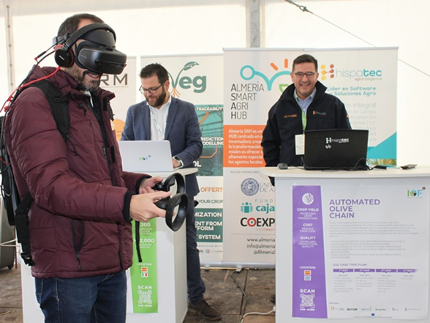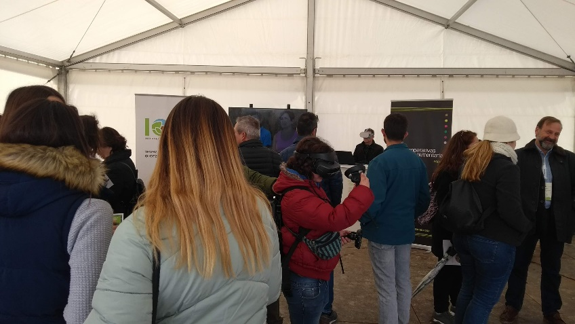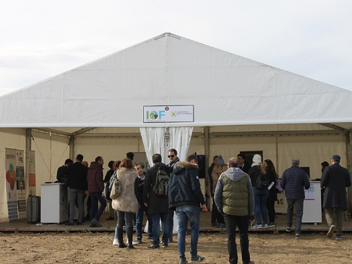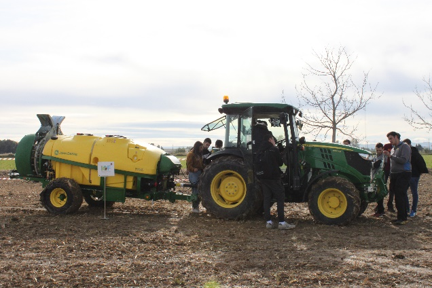Exhibitions IoF2020
This year, once more, the largest digital transformation fair, DATAGRI, was organised in Zaragoza, Spain on the 14th and 15th of November.
The first day, in the Congress Palace, the FORUM reviewed the main current topics, with a high presence of listeners and a great level of speakers in the debate.
On the second day, during the FARMING DAY, IoF2020 participated with a tent in which 6 use cases were exhibiting.
ü Optimization of the beef supply chain
ü Monitoring of pig welfare on farms
ü Intelligent treatments in fruit and vegetable growing
ü Automated oil chain
ü Innovation in the greenhouse tomato value chain
ü Optimized certification system
Thanks to the various means of dissemination used, such as Face to Face interviews, the display of posters, the virtual reality devices and the presence of some of the devices on which the cases work, the public, especially young farmers, were very positive and enthusiast.
|
|
|
|
|
|
What do farmers need from the digital transformation?
On the first day IoF2020 was present at the FORUM in a visible way. A survey was carried out among the attendees, organized by two DATAGRI partners, Hispatec and Cooperativas Agroalimentarias de España. About 350 people participated, with 29% of representatives from the public and academic sectors, 22% from Agritech companies and 5% from the financial sector. The rest of the participants were agri-food economic agents, 32% of farmers and cooperatives and 11% of agri-food industry and input suppliers.
Among the questions addressed to them, one was aimed at identifying the advantages of digitalization. They were asked which of these innovations they would be willing to pay for.
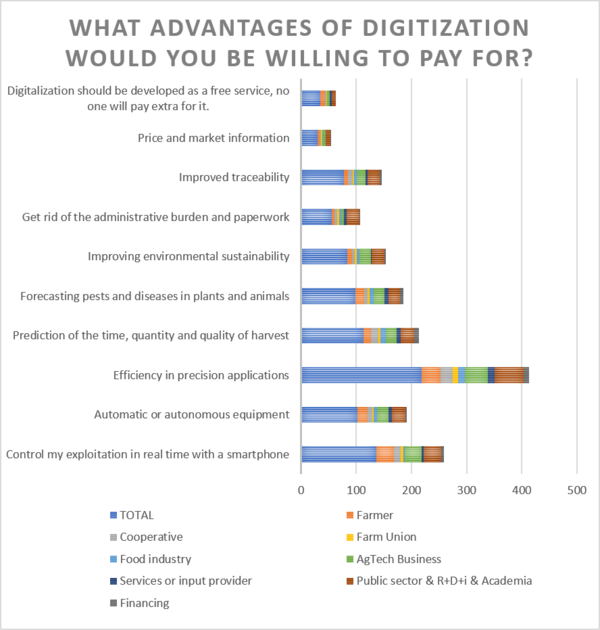
The most popular answer was "Efficiency in precision applications (fertilizers, phytosanitary products, medicines, irrigation, etc)". It is therefore the most valued option for end users (production sector), developers and providers of digital services. This alignment is a good sign.
The only sector that did not choose this option as the first one was the meat ruminant sector, which opted for the benefits of real time control of the farm with a Smartphone.
This response was also the second favourite option, although there was a difference of opinion between types of attendees and sectors. For cooperatives, agribusiness and input providers, and the financial sector, the favourite option was the ability of digitalisation to predict the timing, quantity and quality of the harvest.
By sector, “smartphone control” was the second choice for all subsectors except for greenhouse vegetables, which chose the possibilities of improving their environmental sustainability.
Among the other options offered, automatic or stand-alone equipment and machinery that free up workload, i.e. robots, was also well received. It was particularly appreciated by farmers and by representatives of the public sector and academia. For AgriTech companies, the improvement of environmental sustainability is very relevant, a need that is only welcomed in the greenhouse vegetables sector, as we have shown before.
Although the improvement of traceability does not get good score overall, it does in the olive grove and vineyard sectors. In the rest of the fruit trees another of the favourite advantages is the anticipation of pests and diseases in plants and animals.
In the meat sector, it is worth noting the interest in digitalisation providing them with tools to free themselves from administrative burdens and paperwork.
One other question that suggested interesting information was about the entities that were more trusted. This trust is assessed considering two points. The first is the capacity to act as a driver of digital uptake within farm sector. The second one refers to the ability of entities to create safe and operative data hubs.
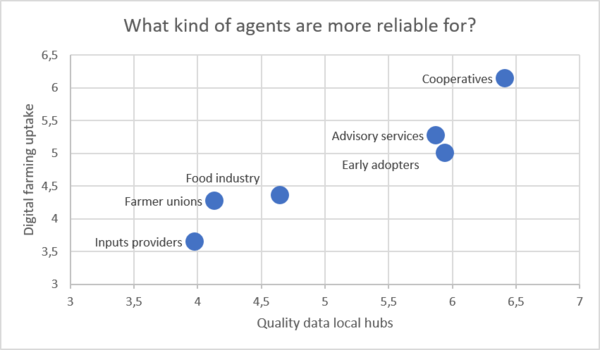
Naturally, if we analyse the responses by type of respondent, the answers tend to be more confident in themselves and their group. Thus, agricultural organizations rely on themselves as essential elements for the diffusion of digital transformation and for the establishment of reliable data environments. The same is true for agri-supply distributors. However, the rest of the respondents place both of them far from the top. The absolute winners are the cooperatives, well scored by all participants. Finally, advisory services and innovative farmers also scored highly.
